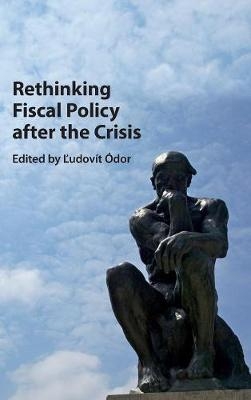
Rethinking Fiscal Policy after the Crisis
Cambridge University Press (Verlag)
978-1-107-16058-3 (ISBN)
Before the financial crisis, fiscal policy often played a secondary role to monetary policy, with the manipulation of interest rates to hit inflation targets being the main instrument of macroeconomic management. However, after the financial crisis and the subsequent euro crisis, fiscal policy has been brought back to the fore. In the past, the limited understanding of the effects of fiscal policy, neglect of monetary-fiscal interactions, faulty institutional set ups or ignorance of market expectations often led to bad policies. This book, written by a team of leading economists, seeks to address the current oversight of fiscal policy and to upgrade our understanding and conduct of fiscal policy, presenting a well-balanced diagnosis and offering several important lessons for future fiscal analysis and policymaking. It is an essential read for academics and graduate students focused on the current debate over fiscal policy, as well as policymakers working on day-to-day policy issues.
Ľudovít Ódor is a member of the Council for Budget Responsibility in Slovakia and Vice Chair of the Network of EU Independent Fiscal Institutions. In the past, he has served as a member of the Bank Board at the National Bank of Slovakia and Executive Director responsible for research, an advisor to the Prime Minister and as a Chief economist at the Ministry of Finance of the Slovak Republic. His book, The Euro Area and the Financial Crisis (Cambridge, 2014), was written with Miroslav Beblavý and David Cobham.
1. Introduction and overview Ľudovít Ódor; Part I. Frontiers of Fiscal Policy: 2. Fiscal analysis is darned hard Eric M. Leeper; 3. Fiscal implications of central bank balance sheet policies Athanasios Orphanides; Part II. Better Institutions for Better Fiscal Policy: 4. Fiscal rules in the world Klaus Schmidt-Hebbel and Raimundo Soto; 5. Fiscal councils: rational and effectiveness Roel W. M. J. Beetsma and Xavier Debrun; 6. Fiscal discipline in a monetary union without fiscal union Charles Wyplosz; 7. Lost in complexity. Towards a decentralised and de-politicised fiscal framework in Europe Ľudovít Ódor and Gábor P. Kiss; 8. Partial fiscalisation: some historical lessons on Europe´s unfinished business Michael Bordo and Harold James; 9. Managing the euro area debt crisis George Kopits; Part III. New Analytical Perspectives: 10. Problems with deficit accounting Jerry R. Green and Laurence J. Kotlikoff; 11. Fiscal policy and financial distress: a balance sheet perspective John Fitzgerald and Philip R. Lane; 12. Financial cycles and fiscal cycles Agustín S. Bénétrix and Philip R. Lane; 13. Fiscal sustainability and the financial cycle Claudio Borio, Marco Lombardi and Fabrizio Zampolli; 14. Calibrating the cost of defaulting in models of sovereign defaults Juan Carlos Hatchondo and Leonardo Martinez; Part IV. The Comeback of Discretionary Fiscal Policy: 15. What do we know about fiscal multipliers? Carlo Favero and Madina Karamysheva; 16. Government as borrower and innovator of last resort Richard C. Koo; 17. Fiscal consolidation strategies Christian Kastrop, Boris Cournéde, Falilou Fall and Annabelle Mourougane; 18. Discretionary fiscal policy and recessions Fabrizio Coricelli, Riccardo Fiorito and Francesco Molteni.
| Erscheinungsdatum | 05.05.2017 |
|---|---|
| Zusatzinfo | 45 Tables, black and white; 10 Halftones, black and white; 97 Line drawings, black and white |
| Verlagsort | Cambridge |
| Sprache | englisch |
| Maße | 160 x 237 mm |
| Gewicht | 1040 g |
| Themenwelt | Sozialwissenschaften ► Politik / Verwaltung ► Europäische / Internationale Politik |
| Wirtschaft ► Volkswirtschaftslehre ► Finanzwissenschaft | |
| Wirtschaft ► Volkswirtschaftslehre ► Makroökonomie | |
| ISBN-10 | 1-107-16058-8 / 1107160588 |
| ISBN-13 | 978-1-107-16058-3 / 9781107160583 |
| Zustand | Neuware |
| Haben Sie eine Frage zum Produkt? |
aus dem Bereich


